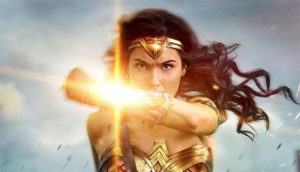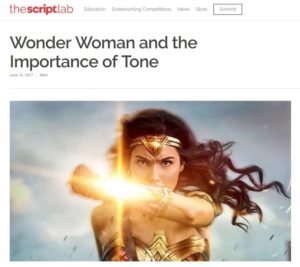 By Valerie Kalfrin
By Valerie Kalfrin
The Script Lab, June 12, 2017
The proper tone in a fantastical story can be as elusive as the truth that Wonder Woman seeks with her golden lasso. Phenomenal powers, secret identities, unusual creatures, high-tech gizmos, mystical lands—all can prove distracting, with the potential to veer too far into bleakness or camp.
What a joy and relief that the new Wonder Woman film gets this gloriously right – an Olympian feat considering how beloved this character has been for 76 years. Instead of dropping in bits about her “satin tights” like the zingy theme song of her 1970s TV show or coffee-mug descriptions of her being as beautiful as Aphrodite and wise as Athena, the film’s creative team led with the character’s compassion and sincerity. By rightly identifying these traits as the key to the character’s enduring appeal, Wonder Woman’s screenplay crafts a masterful tone around authentic characters, thematic contrast, and an appropriate setting befitting the characters own heroic journey.
“I’m tired of sincerity being something we have to be afraid of doing,” director Patty Jenkins tells the New York Times. “I wanted to tell a story about a hero who believes in love, who is filled with love, who believes in change and the betterment of mankind. I believe in it. It’s terrible when it makes so many artists afraid to be sincere and truthful and emotional, and relegates them to the too-cool-for-school department. Art is supposed to bring beauty to the world.”
Audiences and critics have responded with overwhelming support. The film holds a 93 percent “fresh” rating at Rotten Tomatoes and grossed $103 million nationwide (with a budget of $149 million) in its first weekend of release.
STRIKING THE RIGHT BALANCE
Wonder Woman has often been a tricky protagonist whose integrity masks her complexity. Created in 1941 by William Moulton Marston, inventor of the polygraph machine (a real-life lasso of truth) and modeled after suffragettes and centerfolds, she had the look of a wartime pinup wrapped in the heroic archetypes of classical mythology. Ms. magazine touted her as a feminist icon, and an entire generation watched and adored Lynda Carter on the 1970s TV as the hero, spinning as she transformed into her alter ego. (Incidentally, I dressed as Wonder Woman in my kindergarten Halloween parade and, yep, even twirled around the house to battle bad guys.)
“She needs to be optimistic but not naive, fierce but not frightening, unquestionably good but not tragically boring, intriguingly alien but not totally inhuman,” writes Angie Han at Mashable.
 That’s a tall order for anyone, especially in the fantasy realm where tonal missteps are commonplace. Fantasy stories can be rousingly entertaining but also have a sublime potential to work on allegorical levels, whether they’re set in fictional places (the Seven Kingdoms of Game of Thrones, Hogwarts, or Middle Earth), or brushing up against real-world conflicts (James Bond, The Dark Knight, or the Captain America films). Yet lean too far into the fun, and the results turn goofy—fine for The Tick, the blue-suited superhero spoof currently on Amazon.com, or Lego’s adorable take on the DC and Marvel crowd (Spider-Man turns “angsting” into a verb), but disastrous for the likes of 2004’s Catwoman and 2011’s Green Lantern.
That’s a tall order for anyone, especially in the fantasy realm where tonal missteps are commonplace. Fantasy stories can be rousingly entertaining but also have a sublime potential to work on allegorical levels, whether they’re set in fictional places (the Seven Kingdoms of Game of Thrones, Hogwarts, or Middle Earth), or brushing up against real-world conflicts (James Bond, The Dark Knight, or the Captain America films). Yet lean too far into the fun, and the results turn goofy—fine for The Tick, the blue-suited superhero spoof currently on Amazon.com, or Lego’s adorable take on the DC and Marvel crowd (Spider-Man turns “angsting” into a verb), but disastrous for the likes of 2004’s Catwoman and 2011’s Green Lantern.
Double down on the seriousness, and you wind up with 2013’s Man of Steel, featuring a fine Henry Cavill as Superman but turning this bright, hopeful beacon of truth and justice into a strongman who kills. That dour tone continued through 2016’s Batman v. Superman: Dawn of Justice, where the two heroes chose to pummel each other instead of either having the good sense to say, “Help me, my mom’s in trouble.” (My seven-year-old son, who didn’t see the film, asked me why Batman and Superman would be fighting in the first place.) Fortunately Gal Gadot (of Fast and Furious fame) manages to brighten up the film considerably in her all-to brief introduction as Wonder Woman by doing what a hero does best: fight evil.
Wonder Woman gives us the opportunity to see how the titular heroine chose that path. The film itself is a long time coming. Although Allan Heinberg has the sole screenwriting credit, the film is a culmination of a revolving door of screenwriters and plot iterations. Producer Zack Snyder (director of the upcoming Justice League) and Jason Fuchs (screenwriter of Pan) shaped the story, as did Johns and Jenkins. According to producer Charles Roven, all found inspiration in 1978’s Superman starring Christopher Reeve.
“In the comic books there is not a lot of time spent on Wonder Woman’s psychology. What is it she wants and what drives her?” Heinberg told Entertainment Weekly. “A lot of the [previous] treatments have been from the outside looking in.” As it so happens, he knows his heroes well, having written for the Wonder Woman comic as well as Marvel’s Young Avengers before becoming a TV writer and producer for shows like Party of Five, Sex and the City, The O.C., Grey’s Anatomy, and The Catch.
FINDING THE RIGHT CONTEXT
Diana – the film never calls her by her superhero name – is a fierce warrior, thanks to a childhood spent on a timeless island paradise among a race of Amazons created by Zeus to drive jealousy and suspicion from the hearts of humankind. More importantly, she brims with empathy, curiosity, and the ambition to follow in the footsteps of her mother, Queen Hippolyta (Connie Nielsen), and aunt Antiope (Robin Wright). A warrior never wishes to fight, Hippolyta warns, but that’s something Diana must learn for herself.
The film smartly transplants her emergence in modern times from World War II to World War I, where early mechanized weapons and pre-suffrage attitudes clash easily with Diana’s egalitarian confidence. The “War to End All Wars” reaches the Amazons’ beach in the first act when Steve Trevor (Chris Pine), an American pilot working for British Intelligence, crashes offshore while fleeing the Germans with vital information about a weapon of poisonous gas. Men are easily corrupted, Hippolyta cautions, but Diana can’t bear the thought of thousands being slaughtered. She’s convinced that Ares, the God of War, has returned to fuel this conflict and that it’s her duty to defeat him to bring peace.
“Once I find and destroy Ares, the German Army will be good men again, and the world will be better,” she says with endearing naiveté as she and Trevor sail to 1918 London.
 Diana’s black-and-white worldview could have made her a boring naïf, but the filmmakers lean into it a la 1984’s Splashand Marvel’s Captain America films with fish-out-of-water humor that’s both charming and organic. Her underlying intelligence is never in doubt, even as she mistakes corsets for armor and gushes over ice cream. It makes for an effective contrast that lends thematic weight while also lightening the film’s more serious side.
Diana’s black-and-white worldview could have made her a boring naïf, but the filmmakers lean into it a la 1984’s Splashand Marvel’s Captain America films with fish-out-of-water humor that’s both charming and organic. Her underlying intelligence is never in doubt, even as she mistakes corsets for armor and gushes over ice cream. It makes for an effective contrast that lends thematic weight while also lightening the film’s more serious side.
Even in the film’s most harrowing moments, the screenplay side-steps an overly heavy tone by preserving Diana’s resolute principles. Never does her character waver or give into self-doubt. Instead, her confidence is conveyed in a quiet, matter-of-fact sort of way. Diana doesn’t feel the need to assert herself by putting down men (as in the 2009 animated film Wonder Woman) nor by becoming a complete badass (I’m looking at you, Injustice 2). Instead, she’s outraged by brutality and headstrong in her passion. Male characters harrumph over “a woman in the room,” but Gadot plays Diana as above such notions, having “no awareness of social roles. … To her, everyone is equal.”
Diana’s openness creates a heartfelt romance with Trevor, who at first tries to shield her from all the action. He’s flummoxed by her frankness about sex and relationships (she’s not shy about checking him out in the altogether), and the film has great fun at subverting our expectations about the hero and the sidekick, such as when Steve tries to hide how “distracting” Diana is behind that old trope of eyeglasses. (Lucy Davis as his secretary Etta Candy wryly notes how useless that is.) The chemistry between Gadot and Pine is excellent, adding a layer of nuanced romanced to the film’s tonal palette. His decent but combat-weary characterization finds Diana’s innate optimism melting his defenses as she struggles with, and absorbs the many contradictions of human nature.
With Diana’s sincerity as a guide, the shape of the story hews closer to a coming-of-age story than a traditional save-the-world romp. And it’s her authentic, and often humorous supporting cast gives the film a surprisingly character-driven feel, preventing the dire World War One setting from becoming overbearing. Steve’s cohorts add a wonderful layer of humanity to the film, with Chief (Eugene Brave Rock), a Native American, explaining he’s a smuggler who has no home in the United States because Steve’s “people” killed his. Scottish sniper Charlie (Ewen Bremner) is plagued by night terrors. And Sameer (Saïd Taghmaoui) notes he had always wanted to be an actor but was the wrong color. “Everyone is fighting their own battles, Diana,” he says. “We cannot be what we want to be all the time.”
It goes without saying that the film has exhilarating fight scenes, including a watershed midpoint where Diana resolutely climbs out of the trenches to cross No Man’s Land – the real name for the dead zone along the front lines of battle – after scoffing off the war-time mantra that she can’t help everyone. By underlining the action with this kind of thematic weight, the story raises intriguing questions about the source of evil and the role personal responsibility.
Action beats like the No Man’s Land sequence are so dynamic and multi-layered that the film’s final half hour, which resorts to the usual pyrotechnics and CGI-heavy fisticuffs, pales in comparison. The villains, including Danny Huston as a German general and Elena Anaya as his chemist, don’t clash with Diana in any meaningful way over the course of the plot. Instead, as IGN’s Joshua Yehl notes, “the film’s true antagonist is war itself.” And it’s this contrast of war with Diana’s own resolute heroism that comes to define Wonder Woman’s tone.
Even as Diana is shaped by the harrowing events that play into the film’s sometimes sobering tone, the screenplay never loses sight of what fans love about her in the first place. Gadot shines – even when Diana is stricken by disillusionment, heartache and loss. It’s all too easy to become bitter; to lose faith in others and show no mercy in trying, hopeless times – instead, Diana embraces goodness as a choice, and that’s ultimately what makes her heroic.
“It’s not about what you deserve. It’s about what you believe, and I believe in love,” she says.
Kudos to this marvelous film for making us believe that, too.
Original link: https://thescriptlab.com/features/main/7073-wonder-woman-and-the-importance-of-tone/

